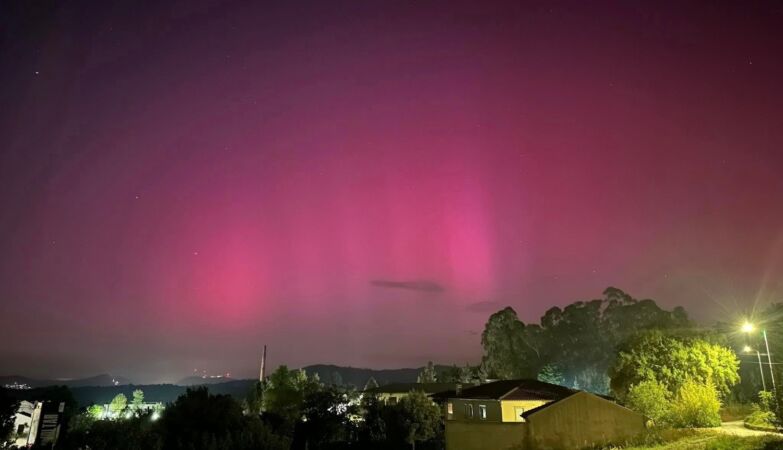Meteo Trás os Montes / Facebook

The aurora borealis appears in Portugal on the night of May 10, 2024
Space meteorologists announced that the aurora borealis will continue to be seen in less usual places, such as Portugal, while the strong solar storms that allow the phenomenon to occur continue.
to Strong solar storms Unleash this year Shimmering twilight Much further south than usual, as in Portugalfilling the sky with shades of pink, purple, green and blue.
The most recent case occurred last week. The night sky became more colorful, especially in the mountainous areas in the center and north of the country.
Meteorologist Marcio Santos has collected and compiled the best images of this phenomenon on his social networks.
Aurora in Vimioso, Terras de Trás-os-Montes, Portugal 🇵🇹#Northern Lights #northern lights pic.twitter.com/0TwFOXp15Z
– Márcio Santos – Meteorology and Environment (@MeteoTrasMontPT) October 10, 2024
The northern lights in Macedo de Cavaleiros, Terras de Trás-os-Montes, are visible to the naked eye! #Northern Lights #northernlights pic.twitter.com/grDsdDJSZg
– Márcio Santos – Meteorology and Environment (@MeteoTrasMontPT) October 10, 2024
Castelo Branco, Beira Baixa, Portugal 🇵🇹#northern lights #Northern Lights pic.twitter.com/c80wnuUM77
– Márcio Santos – Meteorology and Environment (@MeteoTrasMontPT) October 11, 2024
the The Sun is currently in the maximum phase of its 11-year cyclemaking solar “flares” and northern lights more frequent.
As NASA and NOAA explained to The Associated Press, this active period is expected to continue for at least another year, although the moment when solar activity will peak remains to be seen. It will only be known months after the fact.
He highlighted that this solar cycle produced more colorful aurora borealis in the south and more are likely to appear. Kelly Couricfrom NASA.
“We can still get some good performances in the coming months,” the scientist stressed.
These storms too It can disrupt power and communicationstemporarily.
Before a solar flare, the National Oceanic and Atmospheric Administration (NOAA) warns operators of power plants and spacecraft in orbit.
In May, the National Oceanic and Atmospheric Administration (NOAA) issued a rare… Severe geomagnetic storm.
The storm that struck Earth was the strongest in more than two decades, causing the aurora borealis to appear in the Northern Hemisphere.
In the same month, scientists recorded The largest eruption on the sunBut the land was out of the way.
Previous solar cycles have produced more intense storms than those in May, so space meteorologists are watching the sun for any major disturbances, he said. Bill Murtaghfrom Noah.
Last week, a powerful solar storm stunned sky watchers far beyond the Arctic Circle, with aurora borealis appearing in unexpected places, including Germany, the United Kingdom, New England and New York.


